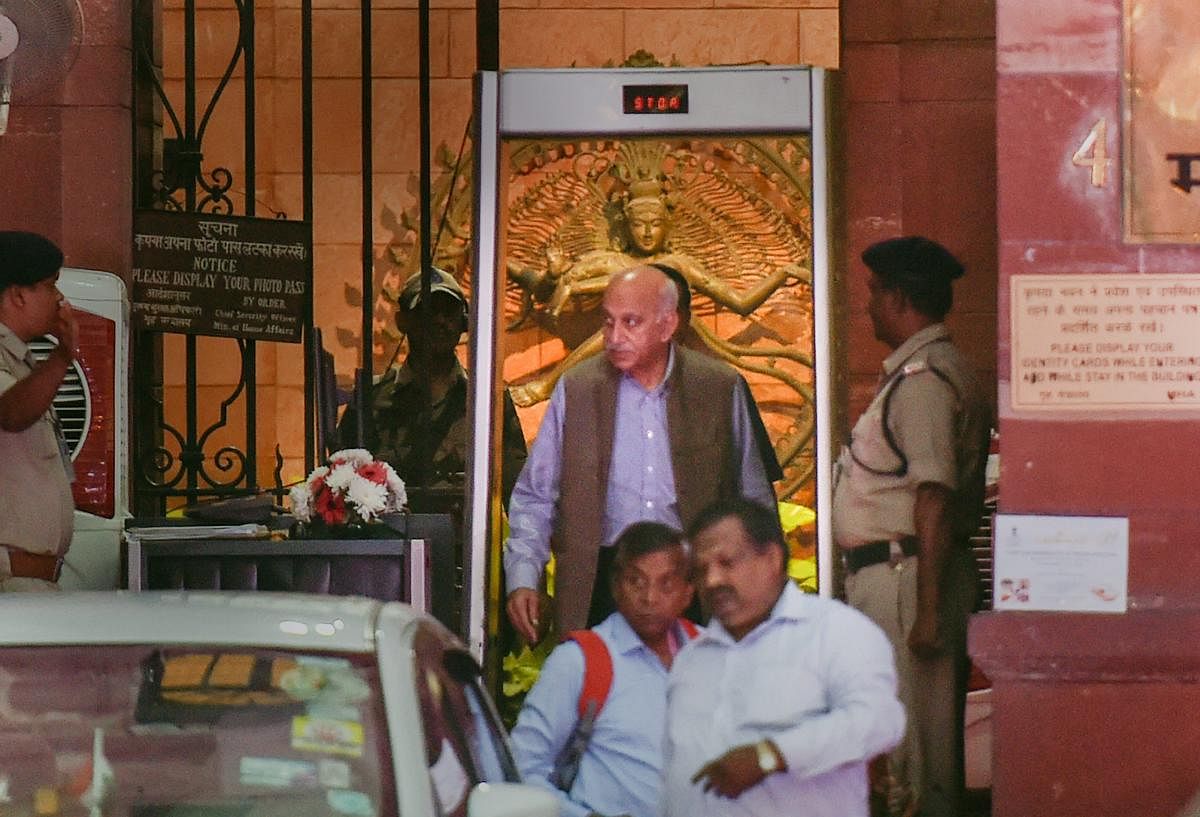
A Delhi court Thursday agreed to hear the criminal defamation case filed by M J Akbar against journalist Priya Ramani, who has accused him of sexual harassment around 20 years ago, and will record the statement of the former union minister on October 31.
Taking cognisance of the complaint, Additional Chief Metropolitan Magistrate Samar Vishal heard the submissions of senior advocate Geeta Luthra, representing Akbar, that the "controversial" tweets and identical social media posts of Ramani caused irreparable loss to his reputation built over a period of 40 years.
"Let the matter be fixed for examination of the complainant (Akbar) and his witnesses for October 31," the magistrate said. Akbar, 67, was not present in the court.
A criminal defamation case, as against a civil defamation case, is significant as an accused could be sent to jail if found guilty. Section 500 of the IPC provides for the sentence for the offence of defamation and an accused may be awarded two-year jail term or fine or both.
In a related development, the Editors Guild of India asked Akbar to withdraw the defamation case and came out in support of the women journalists who accused him of sexual harassment.
The Guild also offered legal support to women journalists who levelled the allegations against Akbar in case he does not withdraw the present case or files such cases against other women too.
Ramani was the first one to call out Akbar and publicly accuse him of inappropriate behaviour.
Over the past 10 days, at least 20 women have come forward to narrate their experiences of alleged sexual harassment at the hands of Akbar during his days as editor of several mainstream publications.
During the 20-minute-long court hearing in the Patiala house courts complex, Luthra, a senior lawyer, referred to the sequence of events and said Akbar resigned from the post of Minister of State for External Affairs yesterday following these allegations and this showed the extent of damage caused to his reputation.
She also referred to the reputation of Akbar as a journalist and sought judicial intervention in the matter by taking cognisance of the complaint.
As per the Code of Criminal Procedure (CrPC), the court would now record the pre-summoning evidence and statement of Akbar and other witnesses, referred to in the complaint and would issue notice to Ramani to face trial if it is satisfied there is prima-facie substance in the complaint.
Akbar tendered his resignation after making it clear he had filed the case in his "personal" capacity and would fight it out in the court of law.
"Since I have decided to seek justice in a court of law in my personal capacity, I deem it appropriate to step down from office and challenge false accusations levied against me, also in a personal capacity," Akbar said in his letter.
Akbar on Monday filed the defamation complaint against Ramani, alleging she "wilfully" and "maliciously" made imputations against him with the ulterior motive of maligning his reputation and political standing.
Expressing her readiness to fight the defamation allegations, Ramani said, "Rather than engage with the serious allegations that many women have made against him, he (Akbar) seeks to silence them through intimidation and harassment."
Akbar's plea had listed alleged defamatory imputations made by Ramani on social media and also referred to his "long and illustrious" career as a journalist while terming the allegations of Ramani as a "figment of her imagination".
"Whilst it is apparent that the accused has resorted to a series of maliciously serious allegations which she is diabolically and viciously spreading in media, it is also apparent that false narrative against the complainant (Akbar) is being circulated in a motivated manner for the fulfilment of an agenda," it alleged.
It had termed as "scandalous" the allegations made by Ramani and said the "very tone and tenor" are "ex-facie defamatory" and they have not only damaged his goodwill and reputation in his social circle but also affected Akbar's reputation in "the community, friends, family and colleagues" and caused "irreparable loss" and "tremendous distress".
In a statement, the Editors Guild said it salutes the courage shown by several women journalists in bringing to light instances of how they were sexually harassed.
"The resignation of Mr M. J Akbar from Union council of ministers is a result of these women journalists' courage to fight for a high principle: gender equality in the newsroom.
"We hope that Mr Akbar will also display the grace to withdraw the criminal defamation case he has filed against one of these complainants," it said.
While Akbar is entitled to all legal instruments available to a citizen to seek vindication, it would be paradoxical for a veteran editor to employ the instrument of criminal defamation, the Guild said, adding, "more so for Mr Akbar who happens to be a former president of the Guild".
"But if he doesn't, or in case he files such cases against other women too, the Guild offers its support to them. If any of them were to need legal advice or assistance, the Guild will do the best it can to help and also appeal to eminent lawyers to represent them pro bono," the statement said.